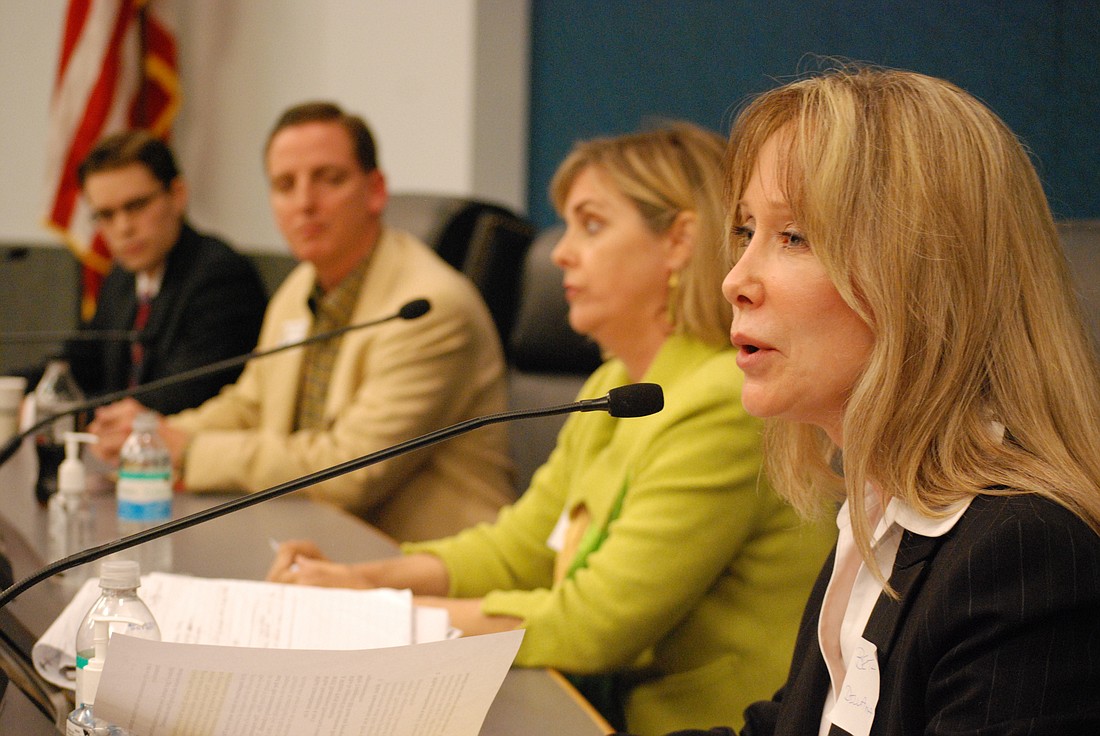- April 25, 2024
-
-
Loading

Loading

If at least 60 percent of citizens vote yes on Amendment 4, any time a government voted to stray from the city's long-term planning document, citizens would then be asked if they agreed with the change.
What would the impact be? The Seminole County League of Women Voters' debate on Hometown Democracy tried to answer that question on March 17, pitting some of the state's biggest proponents both for and against the amendment in a well-attended open forum in Sanford.
Proponents say that politicians, drunk with campaign contributions, have spent decades permissively and promiscuously selling Florida to developers, who take untouched wilderness and turn it into strip malls. Opponents say that, while the latter is true, the amendment would gridlock the state's economy and give developers with deep-enough pockets the best chance of winning the hearts and minds of voters. The league's panel featured Lesley Blackner, one of the architects of Hometown Democracy, squaring off against Ryan Houck, the executive director of Floridians for Smarter Growth, the largest political action committee to oppose the amendment.
Seminole County Supervisor of Elections Mike Ertel was there as a neutral panelist to answer technical questions, and Winter Park City Commissioner Beth Dillaha was also on the panel in favor of the amendment.
"Elected officials… have not been listening to the people they represent for quite a long time," Dillaha said, "particularly when it comes to approving projects that don't conform with land-use policies that have a negative impact on communities."
First the basics: Cities and counties have had comprehensive plans since the 1980s, a response to overdeveloping of the state. The idea was to lock in the future growth of the city in a document, which would be updated every seven years.
If you wanted to build, you had to build within the comprehensive plan. The problem, though, is that when developers want to build something that doesn't fit within the long-term plan, they ask the city to change the plan, and frequently they get the change.
Enter Hometown Democracy. When your elected officials decide to stray from that plan, voters in the entire city or county would then be asked if they agree or disagree with said change.
"They (developers) are terrified of the people having the final say," Blackner said. "They know they have abused the public trust. This is really an intervention. They have been driving drunk with the state for too long, and the people have to take the keys back."
Houck said that for every complex problem, there's a solution that is clear, simple and wrong.
"That's exactly what we have here," Houck said. "It's a proposal that may be very well-intentioned, but ultimately has dramatic side effects which are extremely costly."
Houck said that annually in Florida, there are between 6,000 and 11,000 changes to comprehensive plans, and many of them are dense, technical changes. He pointed to Orange City, where, in 2005, the overhaul of their comprehensive plan would have been a 47-page ballot with 500 questions for voters.
"This proposal could potentially lead to more sprawl, not less," Houck said. "It doesn't empower homeowners associations or citizens groups, but ultimately it empowers those with the deepest pocketbooks, because what this does is turn every sound planning decision into a sound bite."
Dillaha, conversely, pointed to the Carlisle Project in Winter Park, which gathered the ire of the public but was approved by the City Commission. Eventually, the plans weren't finalized, the city was sued and had to spend $3.7 million in a settlement with the developer.
"Ryan talks about Amendment 4 turning planning into politics," Blackner said. "Well guess what, my friends, land use is politics. And we're saying the wrong people are in charge of the politics right now."